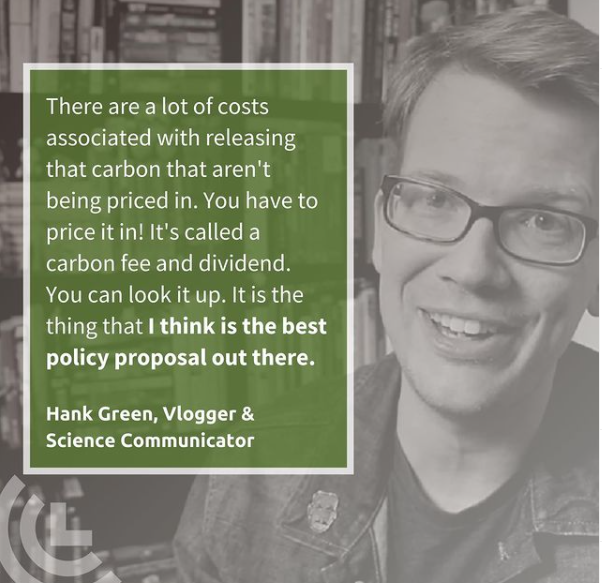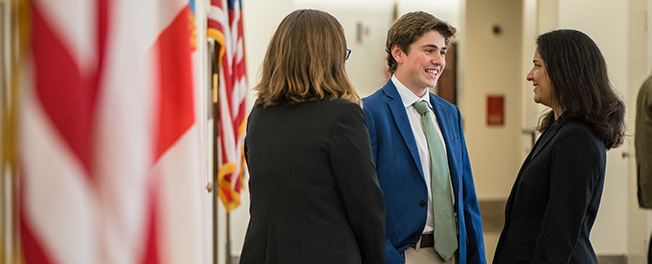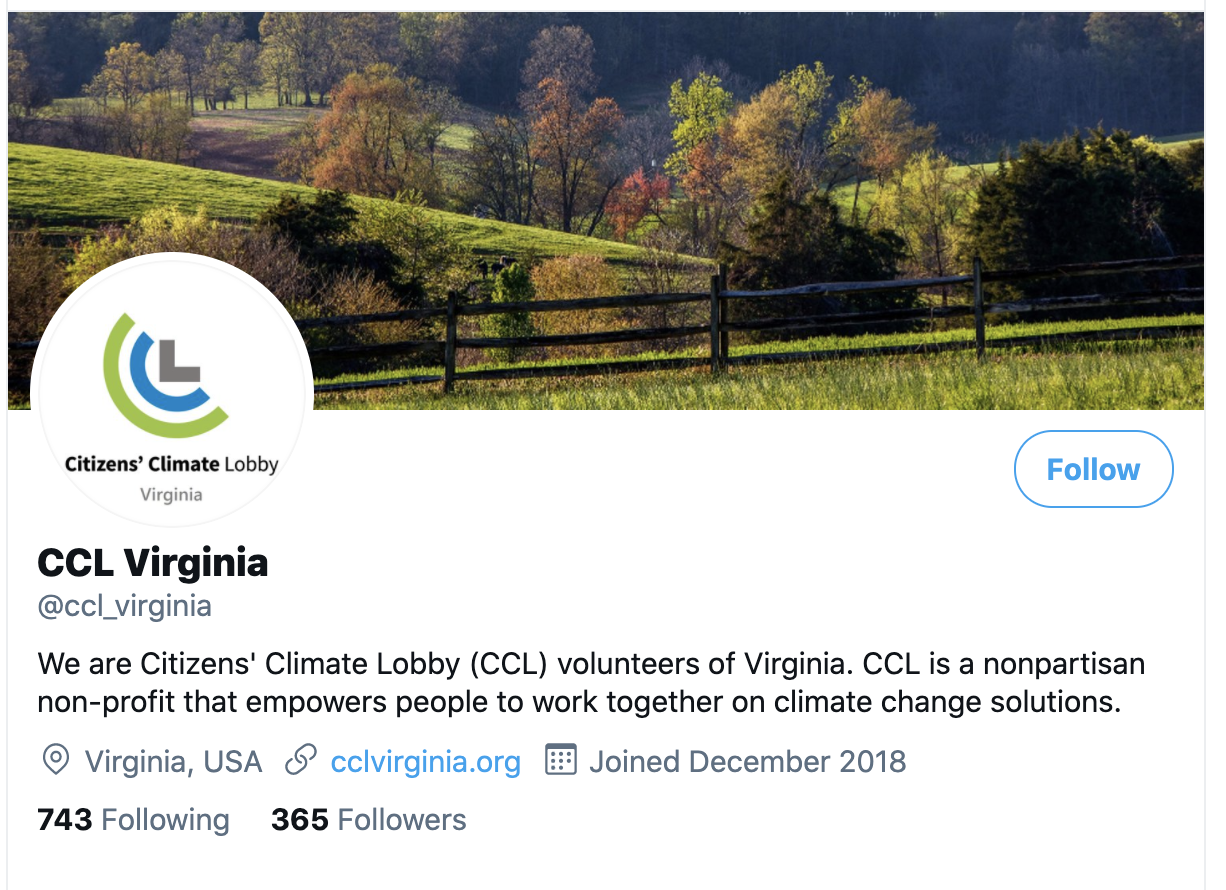
100 Endorsements in 100 Days
Over the course of several months, from March 2021 to June 2021, CCL hosted a National Youth Endorsement Challenge. Young CCL volunteers from all over the country formed teams to gather endorsements for the Energy Innovation and Carbon Dividend Act (EICDA) by reaching out to community leaders and local businesses.
The teams set an ambitious goal: 100 endorsements in 100 days, from leaders across the country.
CCL staffers and youth organizers worked together to organize the event. Organizer Sharon Bagatell came up with the idea after experimenting with it in her local CCL chapter. The goal was to get people engaged in grasstops work and make the idea of endorsements more accessible. At the end of the 100 days, CCL President Madeleine Para gave out awards and congratulated participants in a virtual awards ceremony.
Teams would reach out to potential supporters of the EICDA through multiple methods, from social media to email. Potential supporters received links to an endorsement form on the EICDA’s website. While CCL provided lists of potential organizations, teams were eager to build lists of contacts themselves.
Many youth were hoping that they would have a positive impact on climate action. Bela Filstrup, a member of the Around the Country Team, hoped that this effort would help convince members of Congress to support carbon pricing. A teammate of Bela’s, who asked to remain anonymous, described that getting these endorsements not only showed that youth were getting involved in the movement for carbon pricing, but that youth could make a difference in terms of numbers. Another teammate, Amalia Garrido, was happy to gain experience contacting others for endorsements and said it was fun to work with real people.
The Around the Country Team described their outreach process in detail. Their team spent their early outreach efforts creating lists of contacts and reaching out to them right away. Bela’s teammate added that her team organized weekly meetings after each member had finished school and extracurricular activities for the day. As team members lived across several time zones, they scheduled meetings to accommodate for time differences as well. They created a Google Doc to keep track of meeting notes and write down ideas—this document expanded to 20 pages in length over the course of this challenge. This team divided up their work by color-coding various industries and assigning different team members to reach out to industries that fell under a certain color. They reached out to a diverse group of industries, from fashion to fishing.
The Around the Country Team set goals by searching the web for people they thought were likely to endorse the EICDA, from small businesses to nonprofits to athletes. They reached out using a variety of methods, from email to Instagram messages. They would tailor their messages to each industry by researching how carbon pricing would help that industry’s growth. In case a potential supporter of the EICDA was skeptical of carbon pricing, the team would prepare counterarguments.
Montana Burack, a 15 year old team member from Utah, learned more than she could’ve imagined about the process of pursuing endorsements. While pursuing endorsements seems like an overwhelming and inaccessible process to new volunteers, knowing that her peers were learning and developing their skills alongside her gave her confidence and peace of mind. “I was totally new to this process, but it’s something I realize I want to continue doing now,” she says. “In fact, I just got confirmation from a big name skiers yesterday that they’ve decided to endorse the Energy Innovation Act.”
Montana joined CCL last fall. “I remember going on community and feeling overwhelmed by the amount of actions and resources available to me. I joined the Youth Action Team and saw an announcement about the endorsement challenge in the newsletter,” she notes. While she had previously been involved with local environmental groups like the Utah Sierra Club, she was initially worried about the amount of work and the length of the challenge. But thinking back to her participation in the December lobby drive, she recognized that pursuing prominent endorsements was the natural next step to encouraging more movement on climate legislation.
The endorsement challenge provided a stronger framework for consistency and accountability than any other volunteer work she had done in the past. “Sharon kept telling us that some adults aren’t fond of emailing others, and that we couldn’t fall prey to that concern,” she remembers. “The worst that could happen is that they just say no, and not getting an endorsement is not the end of the world. We just had to keep working towards it and not be scared of trying.”
This kind of persistence is important, since many businesses did not respond to Montana and her teammates’ emails. While it was often frustrating to put in the work for so little reward, it just made them more excited about the ones that did respond. And in the end, they did achieve a lot: 31 endorsements totalling 1,025 points. Their most memorable notable endorsements were from the athlete Amie Engerbretson and the YouTuber MinutePhysics.
As organizations began responding to the team’s requests, the Around the Country Team was excited. Bela’s teammate mentioned that it felt good to be answered. Bela described receiving word that an organization had endorsed the EICDA was “the best feeling in the world”, and that she got “really, really excited” whenever her team would successfully get an endorsement.
Charlotte Sach, another volunteer from the Around the Country Team, noted that strategically choosing your potential endorsements may matter even more than persistence. When asked what advice she would give to other youths looking to pursue prominent endorsements, Charlotte responded: “I understand the excitement of going after Fortune 500 companies. However, I have found that you are more likely to receive a positive response from those you already have a personal connection with. Thus, I would always recommend going after those ‘low-hanging fruit.’ You would be surprised by the amount of people in your life that know an organization or community leader that would happily support a bill like the Energy Innovation Act.”
The Around the World group followed a similar organizational approach. The team assembled a lengthy list of potential shops in their area. From there, the list was sorted from most to least attainable. Although the group focused on email and phone calls in the beginning, they eventually employed social media as a more quick and casual method. Social media made it easier to search for sustainable companies and individuals. After receiving positive responses, the group added a social media template to their Google Doc collaboration along with email and phone call templates.
Another group, the Kaweah Kweens, was composed of youth around the age of 13, with the youngest member being 11. Their group lived in the area in California along the Kaweah River, named after crows by the Yokut people who lived there before. Anna Villavicencio, the leader, heard about the challenge through the Youth Action Team call and invited friends and other youth CCL members near her to form the group. The Kaweah Kweens’ close proximity made it possible to meet in-person several times. More commonly, however, the members stayed connected and even made friendships through Zoom and Google Meet.
In total, the teams managed to get 70 endorsements.
Amalia touched on future plans, saying she would participate in another Endorsement Challenge if one was held. However, she plans on experimenting with other methods of outreach that CCL carries out, believing that it will help her be more well-rounded as an activist. For Montana, her focus is now in helping her CCL chapter leverage the impact of existing endorsers, like getting her mayor to make a video about why he endorsed the EICDA. Next, she plans to pursue endorsements from more local businesses in addition to professional skiers that she looks up to.
Meet the Authors:
Alex Lei is a CCL volunteer based in the Silicon Valley area. He is a member of the CCL Silicon Valley North (SVN) chapter, the SVN Letter Writing Team, and CCL’s Conservative Caucus. He is a graduate of the University of California, Davis, where he majored in biology and minored in professional writing.
Jess Wilber is a recent graduate of Oberlin College, where she majored in Environmental Studies & East Asian Studies and founded the CCL Oberlin College Chapter. She is a former CCL Campus Leader, Regional Fellow, and Intern. Starting in September, she will be undertaking a two-year research and teaching fellowship at Shanxi Agricultural University in Taigu, China through Oberlin Shansi.
Jessica Feng is a rising senior at TJHSST in the Northern Virginia area. She joined CCL in 2020 and is a member of the Fairfax chapter and Virginia CCL Instagram. In college, she hopes to study environmental science and possibly environmental engineering.




